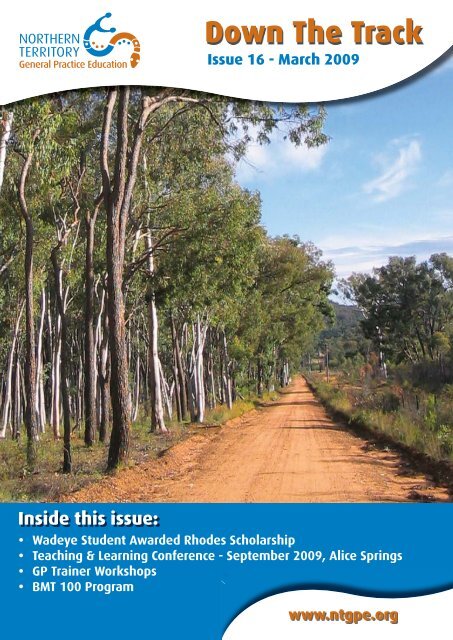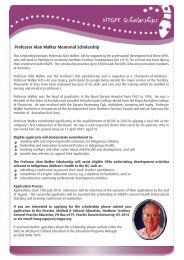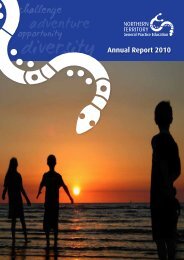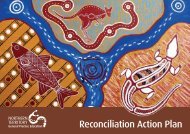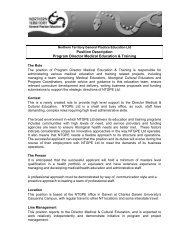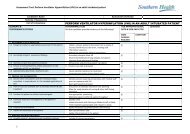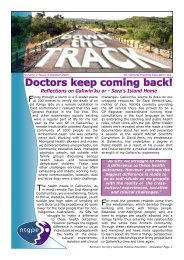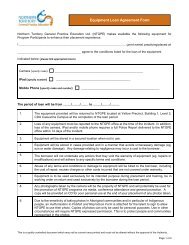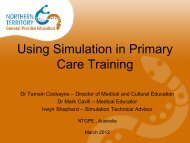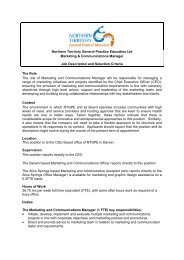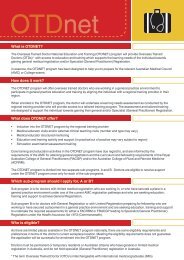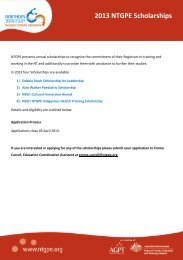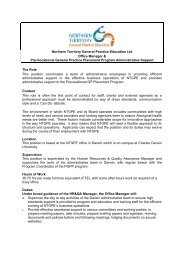Down The Track Issue 16 - Northern Territory General Practice ...
Down The Track Issue 16 - Northern Territory General Practice ...
Down The Track Issue 16 - Northern Territory General Practice ...
You also want an ePaper? Increase the reach of your titles
YUMPU automatically turns print PDFs into web optimized ePapers that Google loves.
Challenge, Adventure, Opportunity, DiversityFrom <strong>The</strong> Executive Director’s DeskDr Michael Wilson<strong>The</strong> view from my desk in the first quarter of 2009 has been incredibly inspiring.NTGPE has entered the year in a stronger position in many respects than previousyears despite national concerns about a looming recession.As a result of the hard work and dedication staff and stakeholders have shownover the past two years as NTGPE has sought to broaden its scope and refineits operational approach, we are now seeing the strength of the organisationemerge on a national scale. Good examples of this approach include:NTGPE’s Teaching and Learning for Health Professionals Conference whichwill again be held in September this year at the Alice Springs Crowne Plaza. <strong>The</strong>conference is an important cornerstone of NTGPE’s emerging multidisciplinedapproach to health professional education, bringing nurses, paramedics,Aboriginal health workers, allied health professionals and doctors together tolearn and share their experiences as educators amid an exciting blend of the latestteaching and learning technologies, theories and methods. <strong>The</strong> conference isbringing the best in health professional education including interstate educatorsright here to the NT.<strong>The</strong> Postgraduate Certificate in Health Professional Education which NTGPEco-delivers with Monash University. This blended model of distance and face toface education brings all health professionals together and provides a fantasticopportunity for cross-fertilisation between educators of different disciplines togain some formal training in health professional education. <strong>The</strong>re are now <strong>16</strong>participants in this course at various stages and their commitment to continuingprofessional development in this area will undoubtedly lift the overall educationstandard in the immediate future.NTGPE’s Cultural Immersion Camp will again take place in July during NAIDOCWeek and is yet another opportunity for health professionals and administratorsalike to interact and learn together through this unique opportunity that willsee six participants live in the Woodygupildiyerr (‘Woody’) community and learnabout Aboriginal culture from the locals.Business Management Training Program (BMT100)NTGPE is now able to support non-clinical managers of Aboriginal CommunityControlled Health Organisations (ACCHO) after successfully winning theCommonwealth Government’s Department of Health and Ageing’s BusinessManagement Training Program (BMT100) Tender - see page 5 for moredetails.Remote Area Health Corps (RAHC)NTGPE isproviding medical and cultural orientation to doctors, nurses andallied lied health professionals engaged by the Remote Area Health Corps (RAHC)before their deployment to remote communities.NTGPE Programs ManualNTGPE has developed a manual to be delivered to all clinics, practicesand health services that details NTGPE’s programs for newcomers to theNT.<strong>The</strong> manual provides a broad overview of the programs relevant toall clinical and administrative staff in understanding their role in relation toNTGPE program participants.Now, more than ever before, NTGPE is devoting its resources to supportour trainees and program participants and investing in the clinicaland training support frameworks we have to support our dynamicclinical, supervisors, trainers and mentors.<strong>Down</strong> <strong>The</strong> <strong>Track</strong> <strong>Issue</strong> <strong>16</strong> - Page 2
We are acknowledging that we can only be as good as the network of educatorswe have behind us and we are proud to support you in a more meaningfulmanner.In doing so, NTGPE has moved towards an increasingly sustainable businessmodel, where our business focus is internal as much as it is external lookingfor opportunities that will benefit the NT from local, interstate and internationalsources.I have met with representatives from Tropical Medical Training (TMT), the northernQueensland Regional Training Provider for GP Training to explore synergies andpossible areas of collaboration with pilot projects. While it is still too early to callon what a collaborative model between the two RTPs might look like, or in whatareas we might collaborate, the intentions of both RTPs are clearly progressiveand I look forward to advising you of the many positive outcomes we expect tosee from this collaboration.Technology will be at the forefront of our business operations and educationthroughout 2009, and with this in mind I can give you a sneak peek into whatNTGPE has in store. We are piloting new online blog services to deliver medicaleducation and support to program participants through a development calledNTGPE Connect. At this stage the pilot is limited to the medical student programand pending successful outcomes we will look towards extending these servicesto all programs. We have made initial investigation into Audience ResponseSystems (ARS) that allow educators to make their presentations more interactivewith instant electronic polling capabilities and also Virtual Patient Simulationsoftware.Dr Peter UnderwoodIn addition to supporting our stakeholders better and makinginroads to advanced technology to keep ahead of the curve,we have also employed Dr Peter Underwood’s extensiveexperience to support our medical and cultural educationstaff. His thirty something years of experience have seen himwork as a clinician in remote areas, including as a Rural GP. Hisprofessional interests complement NTGPE’s purposes insofarasthey include medical education, from the training of healthworkers to trainee GPs, to PhD researchers; health policy anddelivery, cultural aspects of health and applied research.Peter brings with him broad experience in primary medical care andmedical education in Australia and abroad and will help mentor andshape the medical and cultural education program.I would like to congratulate Nicole Lamb, NTGPE’s Junior DoctorProgram Coordinator on her appointment to the NT PostgraduateMedical Council Accreditation Committee (NTPMC).I am also pleased to announce that Dr Hugh Heggie and Dr Zizi Saudiehave been awarded the NTGPE scholarships to participate in theGraduate Certificate in Health Professional Education course conducted dby NTGPE and Monash University.Finally, NTGPE’s strength will always lie in the strength of its networks and whilewe are making significant inroads into supporting you better, we want to hearyour feedback! We want to hear about the things we are doing well and thethings you think we could do better.Dr Zizi Saudie &Dr Hugh HeggieChallenge, Adventure, Opportunity, DiversityMichael WilsonExecutive Director<strong>Down</strong> <strong>The</strong> <strong>Track</strong> <strong>Issue</strong> <strong>16</strong> - Page 3
Trainers’ <strong>Track</strong>sI hope this has whet your appetite for the year ahead and I look forward tocatching up with you all, including many new faces, during 2009.Finally, I extend my congratulations to Hugh and Zizi for being awarded the twoGraduate Certificate in Health Professional Education Scholarships in 2009. As aparticipant in the first two units of the GCHPE last year, I can fully recommendthe study as being not too onerous (important for us busypeople!), stimulating, educational and a heap offun. And as someone who has been involvedin GP training for some time, often withoutmuch in the way of direction or confidence,I can say I have learnt a lot which willundoubtedly improve my effectivenessand enjoyment as a GP Trainer, ultimatelyfor the benefit of our current colleaguesand future successors. So I fully encourageyou to strongly consider this opportunityfor personal and professional developmentand would be delighted to share some of myexperiences of the course, especially over aglass or two of something cold!As always, if you have any queries please contact me viaemail nigel.gray@ntgpe.orgDr Nigel GrayMedical Educator & Training Liaison OfficerChallenge, Adventure, Opportunity, Diversity<strong>Down</strong> <strong>The</strong> <strong>Track</strong> <strong>Issue</strong> <strong>16</strong> - Page 7
GP RegistrarsNTGPE’s marketing strategy compared with other RTPs was very comprehensive,and was praised by other RTPs for the innovative communication methodsemployed in reaching potential applicants using SMS.Site Visits<strong>The</strong> site visit program for 2009 has commenced. <strong>The</strong> visits are being undertakento sites which have medical students, junior doctors and/or GPRs. ProgramCoordinators – Margaret, Nicole and Christine, together with a medical educatorand a cultural educator will be involved with these visits.Recently Christine Heatherington-Tait, GPR Program Coordinator and SamanthaGilbert, GPR Program Admin Assistant visited Tennant Creek. This was a greatopportunity to see where registrars are working and living. It was fantastic tomeet with clinic staff and supervisors with a chance to discuss how registrarsare progressing and any talk through administrativeissues.In conjunction with the site visit to TennantCreek, NTGPE hosted a thank you functionat the Battery Hill Mining Centre whichhosted 30 Tennant Creek stakeholders toan evening of music, great conversation,food and drink. A number of NTGPE staffwere present, Glen Wallace, Marketing &Corporate Services Manager, Jane LewisMarketing Events Administration and KymPhillips who coordinates the BMT100 program& housing portfolio. This was a great occasion on tomeet with a number of people who provide supportservices to NTGPE as well as catch up with the registrars, Ross andKatrina and clinic staff on a casual basis.GPR Conference Program 2009Our next face to face Registrar conference will be held 3-5 Junein Darwin and is aimed at GPRs in basic and advanced terms.<strong>The</strong>re will be an opportunity to mix and relax on an informal basis with aconference dinner being held at Buzz Cafe on the first night.<strong>The</strong> conference topics will include:Aboriginal Health, Sexual Health, Family Violence, Dermatology, GPR Feedback,Private Business and Procedural SkillsChallenge, Adventure, Opportunity, DiversityTraining posts are also invited to participate in the Training Post Expo to be held inconjunction with the Conference on Thursday 4 June 2009. <strong>The</strong> idea is to providea brief presentation, poster, practice pamphlets or website demo about your postto the GPRs to promote your practice/location as the ideal place to work and trainin general practice.Further information will be sent out in the near future. If you wish todiscuss the Training Post Expo please call Christine Heatherington-Tait(08) 8946 6745 or email christine.heatherington-tait@ntgpe.org.<strong>Down</strong> <strong>The</strong> <strong>Track</strong> <strong>Issue</strong> <strong>16</strong> - Page 9
GP RegistrarsChallenge, Adventure, Opportunity, DiversityBreathing NEWLIFE into <strong>General</strong> <strong>Practice</strong> ConferenceNTGPE recently sponsored and attended <strong>General</strong> <strong>Practice</strong>Registrars Australia’s (GPRA) Breathing NEWLIFEinto <strong>General</strong> <strong>Practice</strong> Conference held inthe Great Hall at Parliament House,Canberra on 18 March 2009.<strong>The</strong> conference hosted by GPRA andGPSN was attended by approx 250medical students, junior doctors,registrars, and representatives ofdifferent RTPs, colleges and bodiesassociated with general practice.<strong>The</strong> theme was how to breathe new lifeinto general practice, how to recruit andretain doctors into general practice and whatinnovations have been occurring in general practice training.<strong>The</strong> conference saw the launch of three new projects by GPRA/GPSN.1. GP Compass – the new guide for Prevocational Doctors to GP Training. Ithas been designed to assist prevocational doctors to make informed choicesabout their future career directions. This guide can be obtained via GPRA’swebsite www.gpra.org.au2. Greymatter Website – www.greymatter.org.au is a clearinghouse forinnovation in primary health care. Find the latest trends and practices inprimary health care management, education and training. Explore –Investigate trends in primary health care and explore the future of GP inAustralia. Share – Publish and share your research findings, your knowledgeand your protocols. Search – Newsletters, papers, theses, conferenceproceedings, industry articles, government documents and more.3. R Cubed Website – www.rcubed.org.au GPRA identified that stress andpsycho-social issues can impact on registrars and sometimes lead to traininginterruption and dropout. R Cubed Registrar Resilience Resources is a newpackage of self-care resources. All registrars are encouraged to visit this siteand link into some of the helpful tools offered.<strong>Down</strong> <strong>The</strong> <strong>Track</strong> <strong>Issue</strong> <strong>16</strong> - Page 10
GP Registrars2010 Placement Procedure<strong>The</strong> placement procedure for 2010 will commence at the end of March.Registrars will receive information packs in the mail, so if you have changedyour postal address and have not notified NTGPE please contact Samantha Gilbertsamantha.gilbert@ntgpe.org as soon as possible with your updated details. Aspart of this process you are required to submit a current CV along with yourplacement preference sheet. Please ensure this is done on time.If you have queries regarding your 2009 placements or the upcoming2010 placement process please contact Christine Heatherington-Tait,GPR Program Coordinator on (08) 8946 6745 or via emailchristine.heatherington-tait@ntgpe.org.Learning PlansLearning Plans (LPs) are a mandatory requirement of the GP training program.GPRs take responsibility to develop their individualised Learning Plans. GP Trainersare expected to assist the registrar with Learning Plan development. TrainingAdvisors at NTGPE are available to discuss Learning Plans with their registrars atTA meetings and if required, assist them to develop and review of LPs every sixmonths.A Learning Plan is the outcome of a needs analysis. <strong>The</strong> learning needs analysisrequires a number of skills. Firstly, the learner needs reflection skills to reflecton the facts and their emotions. <strong>The</strong> facts refer to gaps in clinical knowledge,attitudes and skills. For example ‘I have never performed a shoulder steroidinjection.’ Reflecting on one’s emotions refer to one’s confidence in varioustopics - whether the topic has been identified as a gap or not. Being lessconfident in some procedures or consultation processes which you have donemany times, should direct you to reflect on why you are not confident and thenseek appropriate guidance. For example, ‘I have interviewed Aboriginal clientsfor the last 12 months but still don’t feel confident when communicating withAboriginal patients.’ Reflection skills are hard to teach and require practice andguidance. It is an essential skill for GPs to have.Secondly, self-evaluation is required. At this stage you may need to gain evidencefrom your training and experience. Evidence could be sought from:• Observation of your consultations/procedures by your GP Supervisor includingECT Visitor and video consultation.• Observations by you of your GP Supervisor’s consultations/proceduresincluding video consultation of your GPs.• Feedback from pharmacists, AHWs or other members of the health careteam.• Your supervisor rings to ask your advice or vice versa.• Discussion of your case notes with your GP Supervisor.• A reply from a referral that mentions drugs, investigations, procedures ordiagnoses unfamiliar to you.• A patient question or request which requires you to consult a textbook orcolleagues.• Direct feedback from patients includes situations where a patient hasunexpected outcome from management, appears unhappy or becomes angryor fails to adhere to the management plan.• Indirect feedback from patients via receptionists, supervisor, specialist orother colleagues.• Patient satisfaction surveys.<strong>Down</strong> <strong>The</strong> <strong>Track</strong> <strong>Issue</strong> <strong>16</strong> - Page 11Challenge, Adventure, Opportunity, Diversity
GP RegistrarsChallenge, Adventure, Opportunity, DiversityThirdly, the learner and trainer may need guidance. Guidance may come in theform of a checklist that stimulates discussion or asks the learner specific questionsto consider, a list of common GP presentations that the learner should know, a listof high risk presentations the learner should know how to manage appropriately,the RACGP or ACRRM curriculum statements, etc. Some useful proformas areavailable from NTGPE.<strong>The</strong> needs analysis is followed by a process of goal setting. <strong>The</strong> only way to setgoals is the SMART way. SMART is a widely used tool in non-medical professionssuch as in management and is very useful. Below is what SMART stands for andexamples of poor and better goals:SpecificMeasurableAchievableRealisticTime basedI want to ... I will ...Improve on women’shealth skillsUnderstand pre-eclampsiamanagementAttend the EMST coursenext monthParticipate in sharedantenatal care with thevisiting Obstetrician (ina remote Aboriginalcommunity, male GPR)I am going to study hard forthe MCQ exam.Perform at least 5 pap smears aweekAttend divisional CPD on PETadvertised for next month.Register for the next availableEMST courseReview antenatal cases with themidwife and AHW on a weeklybasis.Give myself 6 months beforethe MCQ exam where I willreview check and AFP quizat my weekly small groupmeeting. Every 2 weeks I willgo through cases onGP learning.Monitoring and review completes the cycle of the plan for learning and thelearning plan. Monitoring and review needs to be built into the original timelineof the learning plan. Specific tasks for the review are discussed. <strong>The</strong> learnerwill need to produce evidence that the goals have been achieved. Goals needto be measurable for this to occur. Tasks should include modifying the LP andcreating a new one. New goals are set or previous ones augmented.<strong>Down</strong> <strong>The</strong> <strong>Track</strong> <strong>Issue</strong> <strong>16</strong> - Page 12
International MedicalGraduatesNTGPE’s Clinical Bridging CourseNine International Medical Graduates (IMGs) participated and successfully passedNTGPE’s Clinical Bridging Course held over two weekends in Darwin between14 February and 4 March. Three participants were from Royal Darwin Hospitaland six from private practice. <strong>The</strong> course delivery was interactive with final yearmedical students from Flinders and James Cook Universities attending to act as ‘thepatient’ for clinical role plays. All participants evaluated the skills and knowledgethey gained as pertinent to their everyday practice. <strong>The</strong> course benefits all IMGsin accomplishing ‘cultural competence’ in the Australian health system and is arequirement of the Australian Medical Council (AMC),before IMGs can sit their exams.IMG Education and Support (IMGES) ProgramThis program is expanding to include another category of IMGs – thosein the 5 Year Overseas Trained Doctors Scheme. <strong>The</strong> program willbe modelled on the GPR program and will include peer grouplearning, the clinical bridging course, pre-FRACGP writtenexam workshops, miniCEX, participation in GPRs’ Small GroupLearning (SGL) sessions and biannual conferences.<strong>The</strong> Program Coordinator and Medical Educators will providesupport and mentor participants. We will be contactingindividual clinics in the near future to discuss thesedevelopments and how it may affect them.Challenge, Adventure, Opportunity, DiversityWe currently have seven participants enrolled in thescheme, all of whom are based in urban and rural privatepractices in the Darwin area.For further information please contact Elaine Wills:elaine.wills@ntgpe.org.Elaine Wills, Program Coordinator, IMGES<strong>Down</strong> <strong>The</strong> <strong>Track</strong> <strong>Issue</strong> <strong>16</strong> - Page 13
Junior DoctorsChallenge, Adventure, Opportunity, DiversityRural and Remote Placements<strong>The</strong> Rural and Remote JuniorDoctor Program currently placespostgraduate doctors in years2-3 (PGY 2&3) in 15 rural andremote primarily Indigenoushealth clinics throughout the NT.<strong>The</strong> program has evolved fromplacing just eight junior doctorplacements a year in 2005 to justunder 50 at present.Why has it grown so fast and is it a sustainable model?<strong>The</strong> junior doctor uptake and subsequent growth of the program has been rapidand reflects the need to accommodate the growing number of medical studentsgraduating from Australian Universities by rotating them out of their base hospitaland consequently giving the hospital the opportunity to increase the number ofInterns and Residents they can reasonably employ. This gives junior doctors theopportunity to gain some exposure to general practice, and Indigenous healthin the NT.<strong>The</strong> interest and enthusiasm junior doctors, their base hospital recruitment staffand GP Supervisors have expressed to date indicates that the program in the NTis meeting stakeholder needs and importantly, providing additionalmedical staff resources for each of the communities involved in theprogram.With the growth of the program’s participation rate, NTGPE hassought to ensure that the program is appropriately resourcedwith sufficient accredited placement locations, and trainersacross its now 15 rural and remote clinics. In 2008, NTGPEsuccessfully added Anyinginyi Congress to the list of accreditedtraininglocations available to junior doctors. This will see thecontinuation of junior doctors being supervised by one of the NT’s longstandingremote GPs, Dr Glynis Johns. Glynis has supervised juniordoctors ors in Oenpelli and Ampilatwatja Health Services with greatsuccessso we welcome her back.Ofthe 40 places available in 2009 across all accredited trainingpractices there are only five places left in the rural program. Ifyou would like to know more about becoming an accreditedGPTrainer or clinic to accept junior doctors please contactNicole Lamb.<strong>Down</strong> <strong>The</strong> <strong>Track</strong> <strong>Issue</strong> <strong>16</strong> - Page 14
Rhodes Scholarship Awardedto Wadeye Medical StudentAnthea LindquistChallenge, Adventure, Opportunity, DiversityWe are delighted to announce that one of NTGPE’s former medical students toWadeye, Anthea Lindquist, 24, has been awarded a Rhodes Scholarship.<strong>The</strong> experiences Anthea gained as a medical student in Wadeye provided herwith a valuable foundation to understanding remote Indigenous health.Anthea was enthusiastic about the opportunity to be part of a local healthclinic community and during her application for the scholarship she used herexperiences inthe NT to demonstrate her interest and motivation to study publichealth development at Oxford University in the UK.Asa result of her successful application, the scholarship will fund her Mastersin Global Health Science at the prestigious Oxford University – an opportunitythat will provide her with advanced skills in epidemiology, public healthdevelopment and economics.As a final year medical student, the world and her career is all ahead of herand we are encouraged by the use of her experiences in the NT to open doorsto her future. Congratulations Anthea!For further information about Rhodes Scholarships please follow the link.Applications plications for the 2010 Scholarship open in April/May 2009.<strong>Down</strong> <strong>The</strong> <strong>Track</strong> <strong>Issue</strong> <strong>16</strong> - Page <strong>16</strong>
Medical StudentsNTGPE’s medical student program had a face lift during the first quarter of 2009with the introduction of new technologies including SMS alerts, USB wirelessinternet and an online blog to support our students.<strong>The</strong> new year also brought about a ‘cabinetreshuffle’ that saw Dr Ameeta Patel movefrom her role as the dedicated MedicalEducator to the Medical Student Programin Alice Springs. Ameeta has playedan important role in medical studentadvocacy and support over the pastthree years and will now focus herattention on the GP Training Program.Drs Nada Andric, Darwin and Jim Thurley, AliceSprings have taken over the medical educationrole for the program in 2009 and bring their ownstrengths to their respective roles. Nada is an NTGPE GP Registrar and RegistrarLiaison Officer (RLO), and Jim returns to the role after a four year break withyears of experience as the student program’s medical educator in Alice Springs –Welcome Jim and Nada!<strong>The</strong> program continues to add colour and character to NTGPE’s daily operationswith a fluid trickle of medical students gaining the opportunity of a lifetimein many rural, remote and regional centres. A wonderful example of this wasJanuary’s student cohort which saw 20 students placed throughout the NT andbeyond from placements as diverse as Warburton on the border of WA and NT(Central Australia), through to the Tiwi Islands off the Darwin coastline andeverything in between.For many of the January intake of medical students it was their very first clinicalexperience as John Flynn Scholars, and one that for them will continue in the samecommunities over the next four years, building theirclinical knowledge, confidence, communityrelationships and an experience thatwillgive greater returns to thecommunities they went to eachtime they return with greaterknowledge and skill as theyprogress through their medicaltraining.Challenge, Adventure, Opportunity, DiversityMargaret VigantsRUSC Program CoordinatorDr Nada Andric<strong>Down</strong> <strong>The</strong> <strong>Track</strong> <strong>Issue</strong> <strong>16</strong> - Page 17
Time ManagementChallenge, Adventure, Opportunity, DiversityTime management in the consultation is a common problem voiced by doctorswhatever stage of their training and experience they are at. GPRs often complainthat they, can’t end the consultation, always running behind time; can’t get thepatient out of the door, can’t stop certain patients talking or there are too manyproblems to deal with.<strong>The</strong> first thing to reflect on is - how does being on time/having enough time inthe consultation make you feel? Do you use words like: feeling more productive,more focused, less distracted, more in control and less stressed?So what gets in the way of consulting to time?It may be things to do with practice which have to do with the structure of thepractice; eg, booking times, interruptions, emergencies, not having notes or notbeing prepared before the patient comes in.Possible solutions consulting at 20minute rather than 15 minutes;being properly prepared beforethe patient comes into the room;stopping interruptions andtelephone consultations.Tip 1Acknowledge you’re overloaded.Don’t keep working and doing thingssuboptimally. You will then need tocorrect mistakes and repeat tasks.Tip 2Avoid the afternoon ‘work slump’. This is not the best time for ‘heart sinkpatients’.Tip 3<strong>Practice</strong> saying ‘NO’ to a work request. Don’t take everything on especially,when you don’t know how you are gong to fit it in. You are not superhuman. Itmay be things more to do with YOU which are internal; eg, tiredness, depression,anxiety about unrelated things like family, child care/finances.Possible solutions:Recognising that you are tired and not trying to tackle all the problems thepatient has come with; accepting that you are happier consulting slower thanyour partners or colleagues.Tip 4Remember to eat sensibly, have sufficient breaks, maintain an appropriatelevel of physical activity and ensure sufficient sleep. You will function moreefficiently.Tip 5Do not ignore feedback on consultations’ structure and processes and poor timemanagement; eg, during your ECTVs.<strong>Down</strong> <strong>The</strong> <strong>Track</strong> <strong>Issue</strong> <strong>16</strong> - Page 18
Time ManagementI sometimes hear from trainees that if one listens to patients or attempts tounderstand their ideas and concerns, the consultation will take longer! Is thepatient-centered consultation longer?<strong>The</strong> evidence suggests this is not the case; ie, primary care physicians with morepositive attitudes to psycho-social aspects of patient careused more appropriate communication skills s and asa consequence their patients had more psychosocialdiscussions and appeared moreinvolved. It may be things to do with thepatient; eg, the patient is late, the patientnever stops talking, the patient with acomplicated problem, the depressed orpsychotic patient, not understandingwhy the patient has come, the patientwith a list of problems, giving informationnot on target, etc.Possible solutionsWorking out the structure and skills of the consultationtionwhich help with time management in general practice; eg, listening, discoveringwhy the patient has come, discovering what their most important problem istoday that they want to tackle, checking and clarifying, discovering the patient’sframework and discovering it before you proceed to explanation and planning,summarising, and negotiating a management plan and followup. In doing sopatients become partners in their own care. Levinson and Roter (1995) foundthat physicians who followed this approach did not have longer interviews thantheir colleagues with less positive attitudes.Further reading can be obtained from hungt.nguyen@ntgpe.org.Challenge, Adventure, Opportunity, Diversity<strong>Down</strong> <strong>The</strong> <strong>Track</strong> <strong>Issue</strong> <strong>16</strong> - Page 19
Calendar of Events2009Challenge, Adventure, Opportunity, DiversityWhen What Where15 April GP Trainer Workshop Nhulunbuy13 May GP Trainer Workshop Darwin3-5 June GPR Conference Darwin10 June GP Trainer Orientation TBA15 July GP Trainer Workshop20-22 July GPR Orientation TBA18-20 September Health ProfessionalsTeaching & Learning ConferenceAlice SpringsCrowne Plaza14-15 October GP Trainer Workshop Tennant Creek4-6 November GPR Conference Alice Springs18 November GP Trainer Workshop Darwin9 December GP Trainer Orientation TBAPartner Organisation Events1-3 May GPNNT Conference Darwin17-20 May 10th National Rural HealthConferenceCairns2-5 July Global Health Conference Brisbane2-4 September GPET Conference Adelaide3 October AIDA Conference Brisbane14-17 October CRANA Conference Alice SpringsFor further information please contact NTGPEemail admin@ntgpe.org or (08) 8946 7079<strong>Down</strong> the <strong>Track</strong>is the newsletter of NT <strong>General</strong><strong>Practice</strong> Education Ltd.Articles, photographs and any othercontributions are always welcome.Please email them to:jane.lewis@ntgpe.org<strong>Down</strong> <strong>The</strong> <strong>Track</strong> <strong>Issue</strong> <strong>16</strong> - Page 20
the<strong>The</strong> Health Professionals Teaching and Learning Conferencewill be held in Alice Springs 18-20 September 2009. <strong>The</strong>conference recognises the importance of dynamic, welltrained inter professional teams in developing and nurturingthe interest and skills of Australia’s future health workforce.With this in mind, NTGPE has brought together a representational advisory committee comprised ofmembers from the Services of Australian Rural & Remote Allied Health (SARRAH), Alice Springs Hospital,Centre for Remote Health, <strong>General</strong> <strong>Practice</strong> Network NT. Menzies School of Health Research, NT ClinicalLearning Branch and the <strong>Northern</strong> <strong>Territory</strong> Clinical School (NTCS).Together, the advisory committee, have been instrumental in developing a program that promisesto be inclusive, innovative and truly representative of the teaching and learning requirements of allhealth professionals regardless of their qualifications. We encourage your participation in the HealthProfessionals Teaching and Learning second conference.Context<strong>Northern</strong> <strong>Territory</strong> <strong>General</strong> <strong>Practice</strong> Education (NTGPE) is the <strong>General</strong> <strong>Practice</strong> Regional Training Providerfor the NT. NTGPE’s vertically integrated educational programs focus on medical students, pre-vocationaldoctors, GP registrars and international medical graduates.<strong>The</strong>se cohorts are supported by NTGPE’s educators and GP trainers. However there are other healthprofessionals who are involved in the supervision, support and education of learners in the communityand in hospitals. This list is not exhaustive but can include Aboriginal health workers (AHW), RegisteredNurses (RNs) and Remote Area Nurses (RANs), allied health professionals, paramedics, specialists (visitingor resident), practice management staff, cultural mentors… the list goes on!NTGPE is responsible for ensuring regionally appropriate responses and verticallyintegrated methods to GP Training meet the specific needs of our teachers andlearners. To this end our mission in 2009 is to broaden our focus to acknowledgeand support the inter professional mentors and educators who support and trainnot just our own clinical supervisors, trainers and educators but anyone that findsthemselves mentoring and educating in health.
Conference Objectives<strong>The</strong> conference will:Provide an NT based professional development opportunity for all health professionalsHighlight inter professional education synergies in an interactive and professionally engaging forumProvide collegial, collaborative/team based approaches to professional developmentPromote teaching and learning models in the cross-cultural contextBring nationally recognised educators and presenters with the latest evidence based methods to the<strong>Northern</strong> <strong>Territory</strong>Participating educators will build on existing skills and are expected to benefit greatly in their teachingroles from the confidence, competence and professional wellbeing promoted at this unique event. It isalso anticipated that these outcomes will have a positive impact on learners’ training achievements.Audience Profile<strong>The</strong> conferences targeted audience includes:Hospital based educators – Specialists, Registered Nurses, Nurse Educators, Allied Health, Paramedics,Community based educators – GPs, RANs, AHWs, public health educators, allied healthAcademics – lecturers, medical educatorsClinical and cultural educators who support, train and/or mentor <strong>Northern</strong> <strong>Territory</strong> <strong>General</strong> <strong>Practice</strong>Education’s (NTGPE) vertically integrated educational programs for medical students, junior hospital baseddoctors, GP registrars and international medical graduates.RegistrationBased on registered interest in this conference, conveners’ anticipate 100 NT based health professionalswill attend the conference. Participants have the following registration opportunities available to them:Early Bird Registration (before the 31 July 2009)$450 - 2 days $225 - 1 day$475 - 2 days incl conference dinner $250 - 1 day incl conference dinnerStandard Registration (after 31 July 2009)$550 - 2 days $275 - 1 day$575 - 2 days incl conference dinner $300 - 1day incl conference dinnerNote:NTGPE Accredited Trainers willreceive FREE registration, travel andaccommodation.
Call for Abstracts<strong>The</strong> Teaching and Learning Conference Convenorsare now calling for potential presenters’ abstracts that encompassthe aims of the conference and broadly represent the audience.Abstracts are sought from:Respected providers of health and clinical education in the NTOrganisations that have a strong relationship with NTGPE specifically and the NT as a whole.Organisations whose contribution to the NT needs recognition as determined by the Teaching andLearning Conference 2009 advisory group.Abstracts may be submitted for the following presentation formats:Poster Presentations (5 Minutes)Interactive Seminar (1 hour)Workshop Presentations (2 hours)Abstract submissions that follow the submission guidelines (outlined below) will be considered againstthe broader conference objectives and should be submitted by Close of Business 30 June 2009.Abstracts should match the conferences themes which include:Clinical supervisionVertical integrationE-learningInter-professional clinical education<strong>Practice</strong> based assessmentReflective teaching and learningTeaching in the rural contextTeaching in the Indigenous contextAbstract Submission GuidelinesAbstract submissions must address the objectives and intentions of the conference outlined broadly above,and may be submitted via email to Dr Ameeta Patel ameeta.patel@ntgpe.org. Abstract submissionsmust identify the following Information:A brief biography of the presenter(s) and the organisation they will be representing<strong>The</strong> style of presentation (i.e. Workshop, Seminar, Poster Presentation)<strong>The</strong> context of the presentation<strong>The</strong> objectives of the presentation<strong>The</strong> key messages; and conclusionsWord Limit: maximum 500 words including title and authors names


